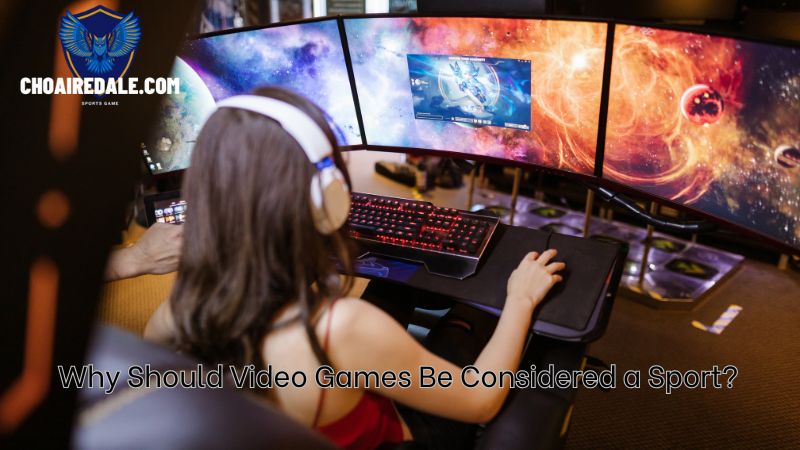The question of whether video games should be considered a sport has sparked considerable debate in recent years. As gaming evolves into a highly competitive and skill-based activity, with professional leagues, massive audiences, and significant financial rewards, its classification as a sport becomes more compelling. Esports, or competitive gaming, has grown exponentially, blurring the lines between traditional sports and digital competitions.
In this article, Cho Airedele will explore why video games deserve recognition as a sport, the similarities between gaming and traditional sports, and the impact this shift in perception could have on society.
What Defines a Sport?
To determine whether video games qualify as a sport, it’s essential to understand what constitutes a sport. While definitions vary, most share key characteristics:
- Competition: Sports involve structured competition with winners and losers.
- Skill and Strategy: Success in sports depends on mastering specific skills and employing strategic thinking.
- Physical or Mental Effort: Many sports require physical exertion, but others emphasize mental endurance and precision.
- Rules and Organization: Sports are governed by established rules and structured organizations.
The Case for Video Games as a Sport
1. Competitive Nature of Gaming
Esports is inherently competitive, with players and teams vying for supremacy in various games such as League of Legends, Dota 2, and Counter-Strike: Global Offensive. Tournaments like The International or the Fortnite World Cup attract millions of viewers and offer prize pools rivaling traditional sports events.
Professional gamers train rigorously to sharpen their skills, just as athletes do in traditional sports. The competitive nature of video gaming fulfills a fundamental criterion for being classified as a sport.
2. Skill and Precision
Like traditional sports, competitive gaming requires exceptional skill. Players must develop:
- Reflexes and Reaction Time: Games like Overwatch and Call of Duty demand lightning-fast responses.
- Strategic Thinking: Games such as StarCraft II and Chess.com require deep strategy and foresight.
- Team Coordination: Esports teams, like their counterparts in football or basketball, rely on seamless collaboration to succeed.
The dedication to mastering these skills is comparable to the training undertaken by athletes in sports like tennis or chess.
3. Mental Endurance
Many traditional sports, such as chess and golf, are celebrated for their emphasis on mental fortitude. Video games, too, demand prolonged concentration, problem-solving, and adaptability under pressure.
Professional gamers often compete in matches lasting several hours, requiring intense focus and mental stamina. These attributes align with the qualities recognized in traditional sports.
4. Physical Demands in Gaming
While gaming lacks the overt physicality of soccer or basketball, it still requires physical attributes:
- Hand-Eye Coordination: Gamers must execute precise movements with their hands while processing visual information on the screen.
- Fine Motor Skills: Success in gaming often depends on rapid and accurate finger movements, akin to playing a musical instrument.
- Stamina: Professional tournaments can span hours, testing players’ physical resilience and ability to maintain peak performance.
Additionally, many gamers engage in fitness routines to maintain the physical health needed for extended gaming sessions.
5. Rules and Organization

Why Should Video Games Be Considered a Sport?
Esports operates under well-defined rules and regulations. Major tournaments have referees, standardized formats, and strict codes of conduct, mirroring traditional sports.
Global organizations such as ESL (Electronic Sports League) and Riot Games oversee esports events, ensuring fairness and consistency. This level of organization reinforces the argument for recognizing video games as a legitimate sport.
6. Massive Global Audiences
Sports captivate audiences, and video games are no exception. Esports events attract millions of viewers worldwide, often surpassing the viewership of traditional sporting events.
For example:
- The League of Legends World Championship in 2022 had over 5 million concurrent viewers at its peak.
- Streaming platforms like Twitch and YouTube Gaming have millions of active users watching their favorite players and teams.
This level of engagement highlights the cultural and economic significance of competitive gaming, putting it on par with traditional sports.
7. Financial Rewards and Professionalism
Esports has grown into a lucrative industry, with top players earning millions through sponsorships, salaries, and tournament winnings. Organizations like FaZe Clan and Cloud9 operate like traditional sports teams, complete with managers, coaches, and support staff.
The professionalization of esports underscores its legitimacy as a sport.
Comparing Video Games to Traditional Sports
| Aspect | Traditional Sports | Esports (Gaming) |
|---|---|---|
| Physical Exertion | High in activities like football | Moderate (hand-eye coordination, stamina) |
| Mental Skill | Critical in sports like chess | Essential for strategy-based games |
| Competition | Integral to all sports | Central to gaming culture |
| Audience | Global reach, billions of fans | Growing, with millions of viewers |
| Organization | Regulated by official bodies | Overseen by esports leagues |
While differences exist, the parallels between video games and traditional sports are undeniable.
Counterarguments and Rebuttals
1. Lack of Physicality
Critics argue that the lack of physical exertion disqualifies video games as a sport. However, not all traditional sports are physically demanding. Activities like chess, darts, and billiards are widely regarded as sports despite their minimal physical requirements.
2. Perception of Gaming as Entertainment
Some view video games solely as entertainment rather than a competitive sport. While casual gaming is indeed recreational, esports represents a distinct, professional sphere with high stakes and rigorous demands.
3. Inclusivity
Esports advocates argue that its lack of physicality makes it more inclusive. Players of all physical abilities can compete at the highest level, broadening the definition of what constitutes a sport.
The Impact of Recognizing Video Games as a Sport
1. Increased Funding and Opportunities
Recognition as a sport could open doors to more funding for esports programs in schools and universities, encouraging young talent to pursue gaming professionally.
2. Broader Acceptance
Elevating video games to the status of a sport could shift public perception, reducing the stigma often associated with gaming.
3. Expansion of Traditional Sports Organizations
Sports organizations may collaborate with esports entities, creating hybrid events and fostering a stronger connection between traditional and digital sports.
Esports and the Olympics
One of the most significant milestones for video games is their growing association with the Olympic Games. While not yet an official Olympic sport, esports was included as a demonstration event in the 2023 Olympic Esports Series.
This inclusion signifies a step toward mainstream acceptance and paves the way for video games to be recognized on the global sports stage.
Conclusion
Video games should be considered a sport because they embody the core attributes of competition, skill, and organization that define traditional sports. Esports has proven its legitimacy through professional leagues, global audiences, and the dedication of its players.
As gaming continues to grow in popularity and influence, the debate over its classification will likely fade, replaced by widespread recognition of esports as a true sport. Whether you’re a casual gamer or a die-hard fan, there’s no denying that video games have earned their place in the world of sports.












